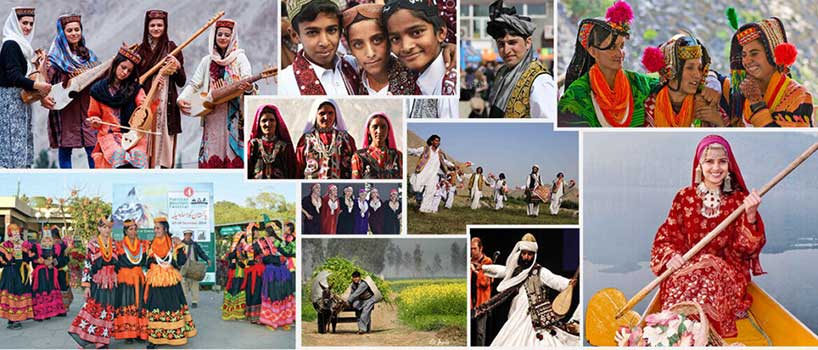By: Ayesha Saleem
Student of Food Science Technology
The University of Okara
fizosaleem8878@gmail.com
Culture is an integral whole that profoundly influences human ideas, actions, and ways of life. It encompasses
The diversity of Pakistan’s culture can be traced back to its history of invasion and occupation by various peoples. Over the centuries, the region has been influenced by the White Huns, Persians, Arabs, Turks, Mongols, and other groups. This cultural amalgamation has resulted in a rich tapestry of traditions and customs. Different ethnic groups within Pakistan exhibit variations in culture, especially in areas where indigenous pre-Islamic customs differ from Islamic practices.
Islamic values and traditions play a significant role in shaping Pakistani society. Mosques are present in almost every neighborhood, and the call to prayer can be heard five times a day throughout urban areas. The Islamic faith is deeply ingrained in the daily lives of Pakistanis, influencing their actions, interactions, and overall way of life.
Pakistan is a linguistically diverse country with various languages spoken and understood across different regions. Urdu serves as the national language, while Punjabi, Sindhi, Seraiki, Pashto, Balochi, Hindko, and Brahui are regional languages. The linguistic diversity adds richness to the cultural fabric of Pakistan and reflects the multicultural nature of the country.
One of the remarkable aspects of Pakistani culture is its mixed nature. It is a beautiful blend of Punjabi, Sindhi, Pathan, Balochi, Barohi, Seraiki, and Kashmiri cultures. Each region contributes its unique traditions, music, dance, and cuisine, making Pakistan a vibrant and diverse nation. The presence of Hindu communities in Sindh further enriches the cultural practices, incorporating elements of dance and music into the local traditions.
Literature holds a significant place in Pakistani culture. The country boasts a wealth of literary works in languages such as Urdu, Punjabi, Sindhi, Pashto, Balochi, and Kashmiri. Renowned literary figures like Maulana Azad, Iqbal, Waris Shah, Shah Abdul Latif, and Khan Akhund Dardeeza have contributed masterpieces to the literary canon. Pakistani literature reflects the nation’s history, struggles, and aspirations.
While Pakistan is a country with diverse cultures and traditions, it is important to acknowledge that it is largely a patriarchal society. Gender roles and notions of inferiority and superiority based on gender are still prevalent in various aspects of Pakistani society. Efforts towards gender equality and empowerment are being made, but there is still progress to be made in this area.
Traditional attire is an important aspect of Pakistani culture, showcasing the diversity and vibrancy of the nation. Traditional garments such as Shalwar Kameez, Kurta, Pakistani Waistcoat, Achkan and Sherwani, Churidar, and Pajama are widely worn. These garments are known for their colorful and intricate designs, adding to the attractive look during national fairs and festivals.
Pakistan has a rich tradition of fairs and festivals celebrated nationwide. These include annual Urs (death anniversaries) of saints, horse and cattle shows, polo festivals, and religious events like Shabe-Barat, Shabe-Qadar, Eid-ul-Fitr, Eid-ul-Adha, Milad-un-Nabi, and Youm-e-Ashura. These celebrations bring communities together, fostering unity and a sense of shared heritage.
Sports play a significant role in Pakistani culture. The people of Pakistan are enthusiastic about sports, particularly hockey and cricket. The country has produced remarkable sportsmen and women in these fields. Traditional sports like wrestling, boxing, and athletics also have a strong following and are part of the cultural fabric.
Pakistan enjoys international recognition for its handicrafts. Craftsmanship in wooden furniture from Chiniot, sports goods from Sialkot, and embroidery from Multan and Hyderabad is highly esteemed. These handicrafts showcase the skills and creativity of Pakistani artisans and contribute to the country’s cultural heritage.
Religious festivals hold great importance in Pakistani culture. Muslims celebrate festivals such as Shabe-Barat, Shabe-Qadar, Shabe-Miraj, Eid-ul-Fitr, Eid-ul-Adha, Milad-un-Nabi, Youm-e-Ashura, and observe the holy month of Ramadan according to the Islamic lunar calendar. These festivals are marked by special prayers, feasts, and acts of charity, bringing communities together in shared spiritual devotion.
In addition to religious festivals, Pakistan also observes important national events. Independence Day, Pakistan Day, Defense Day, Air Force Day, Iqbal Day, and Quaid-e-Azam Day are celebrated throughout the country, instilling a sense of patriotism and unity among Pakistanis. Cultural ceremonies and festivals further contribute to the richness of Pakistani culture. Events such as Lok Virsa Mela, Horse and Cattle Show, Besant or Jashn-e-Baharaan, Kalash festivals, Polo festivals at Shandur, Norouz festivals, Silk Route festivals, Sibi Mela, Mela Chiraghan/Mela Shalamar, Chand Raat, marriage ceremonies, Urs, and Sindh festivals showcase the diversity of traditions and cultural practices across the country. These events are colorful and lively, providing opportunities for people to celebrate their heritage and identity.
In short, Pakistani culture is a rich tapestry woven from the threads of its Islamic heritage, diverse regional influences, literature, traditional attire, festivals, sports, handicrafts, and cultural ceremonies. It reflects the nation’s history, values, and identity. The diversity and vibrancy of Pakistani culture make it a unique and fascinating aspect of the country’s identity.


